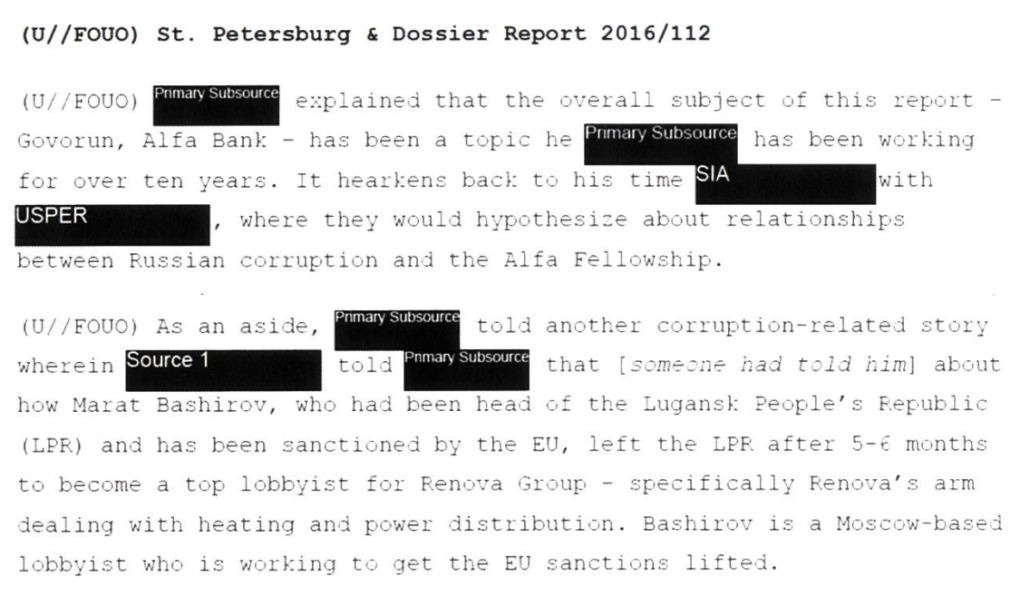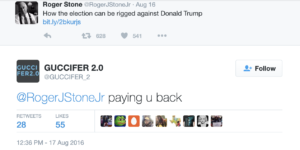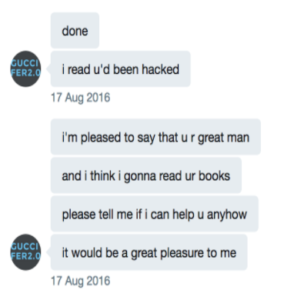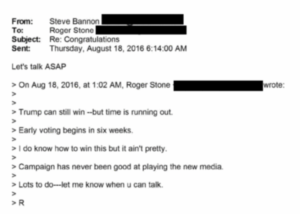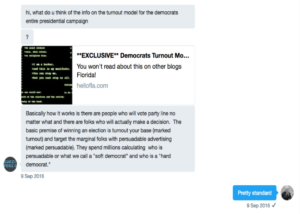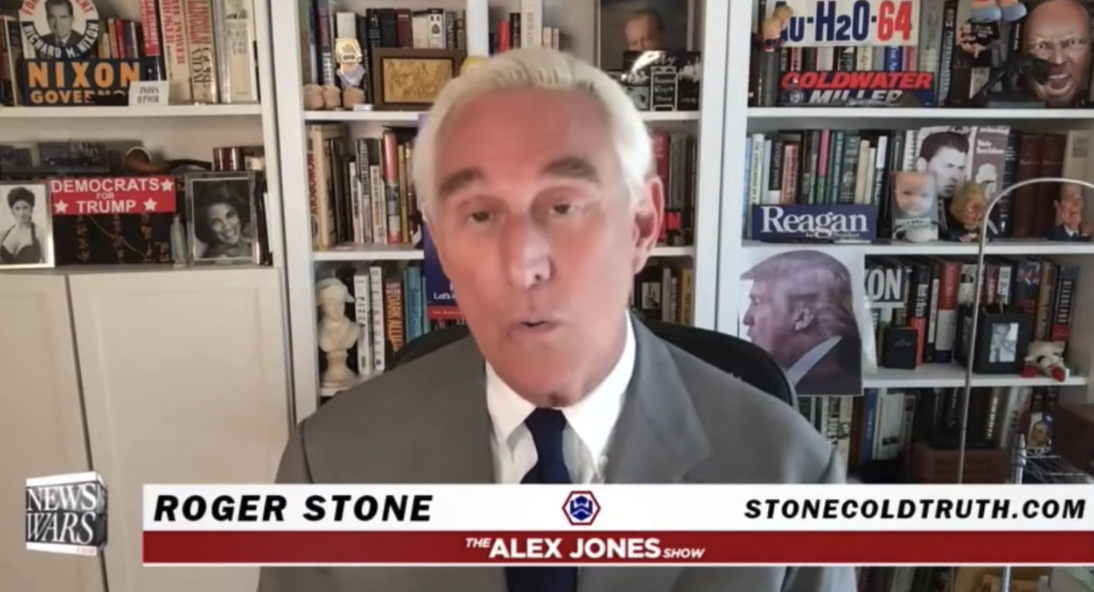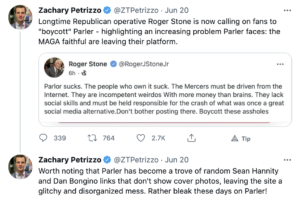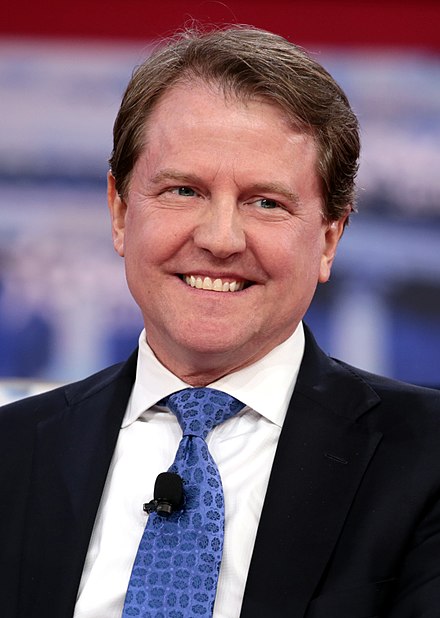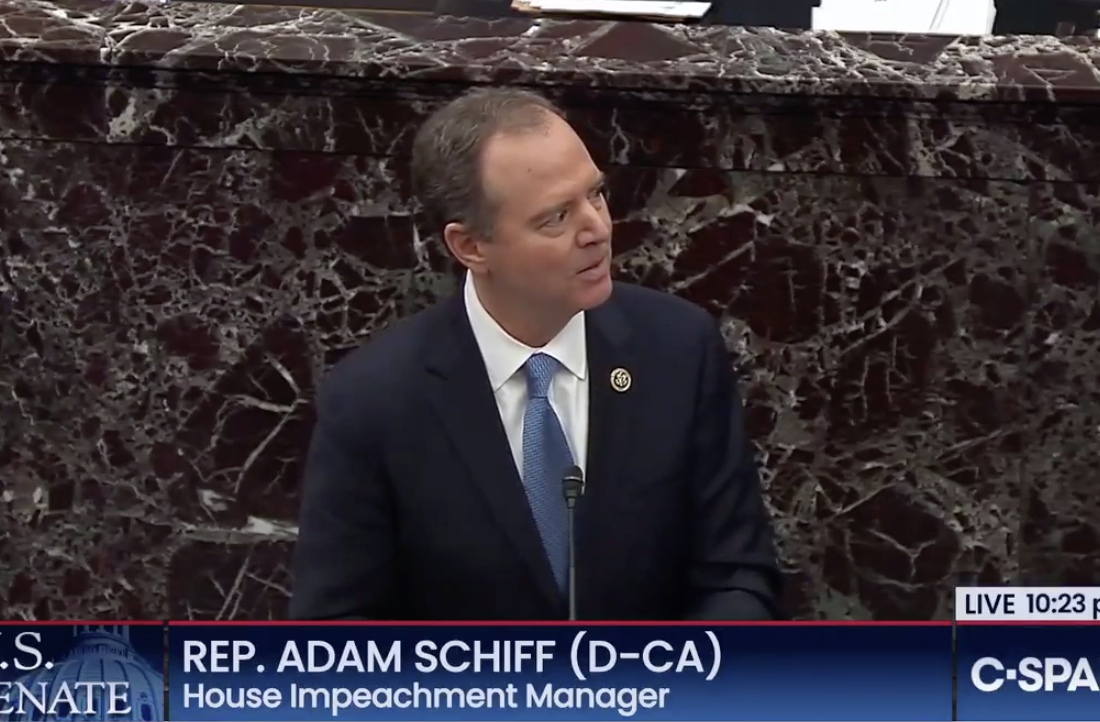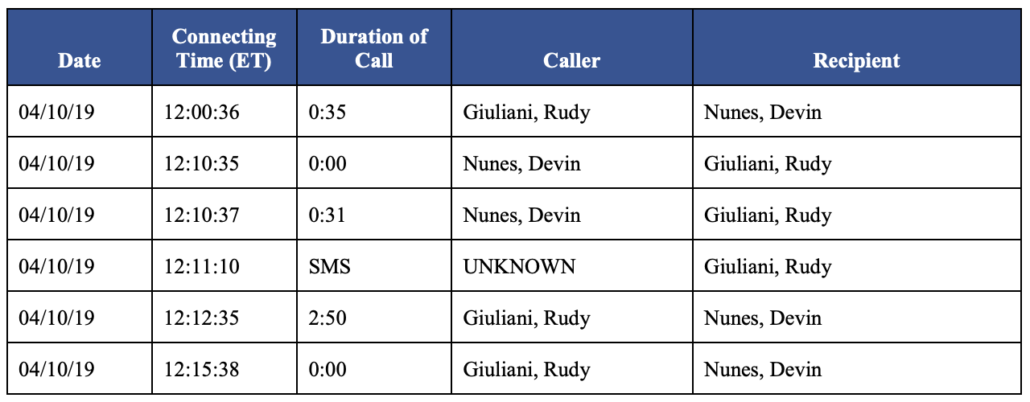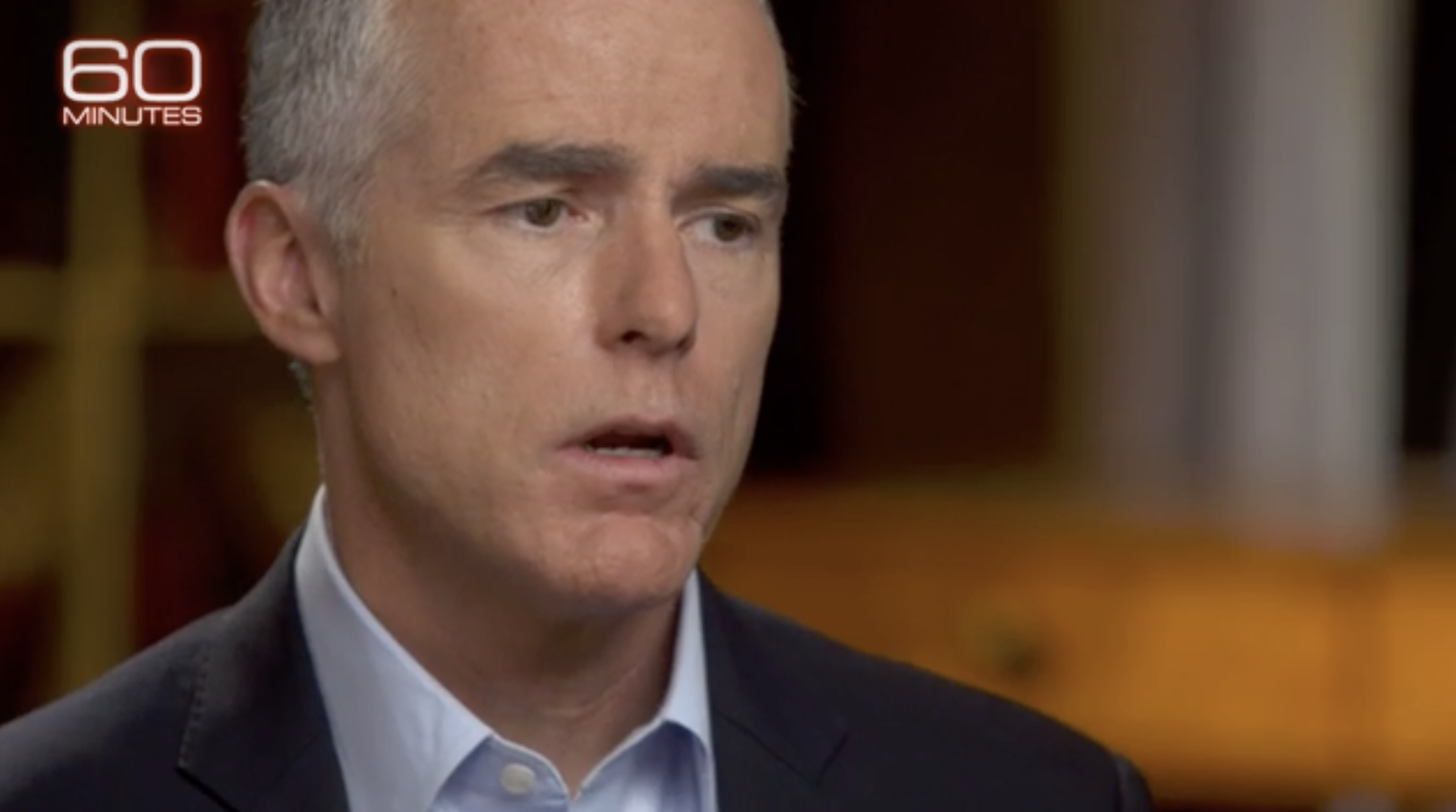For some reason, this Twitter thread by a guy named Darrell Cooper, purporting to explain why Trumpsters came to attack the US Capitol, went viral.
I resisted several requests to fact check it. Now, after it has gone even more viral (including on Tucker Carlson’s show), Phil Bump has done a good fact check. As Bump notes, while Cooper accurately lays out that Trump supporters have lost confidence in institutions, Cooper offers an explanation that relies on a series of false claims so as to put the blame on Democrats.
It is indisputably the case that Trump supporters accept claims about election fraud in part because of their diminished confidence in institutions such as government and the media. What is subject to dispute, though, is the cause of that lack of confidence. While Cooper suggests that it’s emergent, it isn’t. While Cooper argues that it’s a function of investigations into Trump, it’s actually a function of partisan responses — largely but not entirely on the right — driven by Trump himself. And, most important, what Cooper presents as the indisputable facts undergirding his argument are often misleading or false and a function of partisan defenses of Trump that are common in conservative media.
Bump then debunks Cooper’s claims that:
- The FBI spied on the Trump campaign using evidence manufactured by the Clinton campaign
- We now know that all involved knew it was fake from Day 1 (see: Brennan’s July 2016 memo, etc)
- The Steele dossier was the sole evidence used to justify spying on the Trump campaign
- The entire Russian investigation stemmed from the Page investigation and not George Papadopoulos and Paul Manafort
- Protests planned in case Trump overturned the election were a plan for violence
- There were legitimate concerns about the election
Bump is absolutely right that Cooper makes false claims to be able to blame Democrats and Bump’s fact checks are sound (and really exhausting that they’re still required). Bump is likewise correct that a false claim about the Steele dossier is central to Cooper’s story.

I’d add that Cooper doesn’t mention that his claims about the problems with the Steele dossier matter primarily to the third and fourth FISA orders against Carter Page, and so happened under the Trump Administration and in three cases, were signed by people Trump either kept (in the case of Jim Comey) or put in place (in the case of Dana Boente and Rod Rosenstein).
But according to Cooper’s logic, if the dossier hadn’t existed, a series of events that followed wouldn’t have happened, and so Republicans wouldn’t have attacked their own government. Thus far it’s a typical right wing attempt to disclaim responsibility for their own actions.
What Bump doesn’t mention, though, is that it is now almost universally agreed upon on among Trumpsters that the dossier was the product of Russian disinformation. Lindsey Graham — who conducted an investigation into the circumstances of the Carter Page FISA — thinks it is. Chuck Grassley — who led the investigation into the dossier — thinks it is. Ron Johnson — who also made a show of investigating these things — thinks it is. Chuck Ross — the chief scribe of the dossier on the right — thinks it is. The high gaslighter Catherine Herridge thinks it is. Fox News and all their favorite sources think it is. WSJ’s editorial page thinks it is. None of these people have thought through the implications of that, but they do all appear to believe that the Russians fed disinformation through the Democratic-funded dossier to the FBI.
So, even setting aside the implications of the possibility that the dossier was Russian disinformation, according to Cooper’s narrative, Trump’s supporters wouldn’t have attacked their own government if it weren’t for Russian disinformation that set off a chain of events that led them to lose confidence in American institutions.
But consider the implications of the dossier as disinformation, implications that are evident largely thanks to sources that right wing figures have made great effort to liberate.
In response to a Trey Gowdy question at an interview by a GOP-led investigation into the dossier, Bruce Ohr explained that on July 30, 2016, Christopher Steele shared three pieces of information with him (later in his interview he would add a fourth, Russian doping): Two details from what we now know to be the dossier, as well as a third — that Oleg Deripaska’s attorney had information about Paul Manafort stealing money from Deripaska.
And then the third item he mentioned was that Paul Hauser, who was an attorney working for Oleg Deripaska, had information about Paul Manafort, that Paul Manafort had entered into some kind of business deal with Oleg Deripaska, had stolen a large amount of money from Oleg Deripaska, and that Paul Hauser was trying to gather information that would show that, you know, or give more detail about what Paul Manafort had done with respect to Deripaska.
Byron York provided more background on Steele’s efforts to share information from Deripaska with Bruce Ohr. The IG Report done in response to GOP requests provided still more. For example, the IG Report revealed that Steele had set up a meeting between Ohr and Oligarch 1, whom we know to be Deripaska, in September 2015 (these claims are consistent with the heavily redacted Ohr 302s liberated by Judicial Watch).
Handling Agent 1 told the OIG that Steele facilitated meetings in a European city that included Handling Agent 1, Ohr, an attorney of Russian Oligarch 1, and a representative of another Russian oligarch. 209 Russian Oligarch 1 subsequently met with Ohr as well as other representatives of the U.S. government at a different location.
[snip]
Ohr and Steele also communicated frequently over the years regarding Russian Oligarch 1, including in 2016 during the time period before and after Steele was closed as an FBI CHS.409 Steele told us his communications with Ohr concerning Russian Oligarch 1 were the result of an outreach effort started in 2014 with Ohr and Handling Agent 1, to approach oligarchs about cooperating with the U.S. government. Ohr confirmed that he and Handling Agent 1 asked Steele to contact Russian oligarchs for this purpose. This effort resulted in Ohr meeting with Russian Oligarch 1 and an FBI agent in September 2015.
The IG Report also revealed that in September 23 (around the same time Deripaska was interviewed by the FBI), Steele passed on a claim that Deripaska wanted to share information about Manafort.
On September 23, 2016, at Steele’s request, Steele met with Ohr in Washington, D.C. Ohr told us they spoke about various topics related to Russia, including information regarding Russian Oligarch 1 ‘s willingness to talk with the U.S. government about Manafort.
Far more consistently than using Ohr as a channel for dossier reports (and for a longer period of time), Steele used his ties with Ohr to advance Oleg Deripaska’s interests. And for the entirety of the time that Steele was feeding the FBI dossier reports, that meant Steele was feeding Ohr claims that not only presented Deripaska as a trustworthy actor, but did so in part by promising Deripaska’s cooperation in a criminal investigation of Paul Manafort. The FBI (and Mueller after that) didn’t investigate Manafort primarily for the stuff Deripaska was trying to feed the FBI, but Deripaska was making great efforts to ensure that the FBI would investigate Manafort. In the aftermath of all this, Trump and Manafort blamed Democrats for all this, but in fact, Deripaska was at least as responsible.
According to footnotes that Graham, Grassley, and Johnson had declassified, before Deripaska first started offering to help DOJ criminally investigate Manafort — before that July 30, 2016 meeting between Steele and Ohr — a Deripaska associate likely learned about the dossier project (the same declassification revealed that two Russian intelligence officers had learned of the project before that meeting which, given the belief that several of Deripaska’s associates were Russian intelligence officers, may be the same report).
Ohr told the OIG that, based on information that Steele told him about Russian Oligarch 1, such as when Russian Oligarch 1 would be visiting the United States or applying for a visa, and based on Steele at times seeming to be speaking on Russian Oligarch l’s behalf, Ohr said he had the impression that Russian Oligarch 1 was a client of Steele. 210 We asked Steele about whether he had a relationship with Russian Oligarch 1. Steele stated that he did not have a relationship and indicated that he had met Russian Oligarch 1 one time. He explained that he worked for Russian Oligarch l’s attorney on litigation matters that involved Russian Oligarch 1 but that he could not provide “specifics” about them for confidentiality reasons. Steele stated that Russian Oligarch 1 had no influence on the substance of his election reporting and no contact with any of his sources. He also stated that he was not aware of any information indicating that Russian Oligarch 1 knew of his investigation relating to the 2016 U.S. elections. 211
210 As we discuss in Chapter Six, members of the Crossfire Hurricane team were unaware of Steele’s connections to Russian Oligarch 1. [redacted]
211 Sensitive source reporting from June 2017 indicated that a [person affiliated] to Russian Oligarch 1 was [possibly aware] of Steele’s election investigation as of early July 2016.
In fact, the IG Report completed in response to Republicans’ requests makes it clear: if the dossier was disinformation, that disinformation most likely involved Oleg Deripaska, with whom Manafort was using his position on the Trump campaign in an attempt to patch up financial and legal relations.
Priestap told us that the FBI “didn’t have any indication whatsoever” by May 2017 that the Russians were running a disinformation campaign through the Steele election reporting. Priestap explained, however, that if the Russians, in fact, were attempting to funnel disinformation through Steele to the FBI using Russian Oligarch 1, he did not understand the goal. Priestap told us that
what he has tried to explain to anybody who will listen is if that’s the theory [that Russian Oligarch 1 ran a disinformation campaign through [Steele] to the FBI], then I’m struggling with what the goal was. So, because, obviously, what [Steele] reported was not helpful, you could argue, to then [candidate] Trump. And if you guys recall, nobody thought then candidate Trump was going to win the election. Why the Russians, and [Russian Oligarch 1] is supposed to be close, very close to the Kremlin, why the Russians would try to denigrate an opponent that the intel community later said they were in favor of who didn’t really have a chance at winning, I’m struggling, with, when you know the Russians, and this I know from my Intelligence Community work: they favored Trump, they’re trying to denigrate Clinton, and they wanted to sow chaos. I don’t know why you’d run a disinformation campaign to denigrate Trump on the side. [brackets original]
Of course, for months before Deripaska first started offering (through Steele) to cooperate with the FBI against Manafort, Manafort had been trying to exploit his position on Trump’s campaign to ingratiate himself with (among others) Deripaska, in part in hopes to paper over precisely the financial dispute that Deripaska was, through Steele, trying to use to increase Manafort’s legal exposure. Weeks before the July 30 Steele-Ohr meeting, for example, Manafort had offered to brief Deripaska on the Trump campaign.
Immediately upon joining the Campaign, Manafort directed Gates to prepare for his review separate memoranda addressed to Deripaska, Akhmetov, Serhiy Lyovochkin, and Boris Kolesnikov,879 the last three being Ukrainian oligarchs who were senior Opposition Bloc officials. 880 The memoranda described Manafort’ s appointment to the Trump Campaign and indicated his willingness to consult on Ukrainian politics in the future. On March 30, 2016, Gates emailed the memoranda and a press release announcing Manafort’ s appointment to Kilimnik for translation and dissemination.881 Manafort later followed up with Kilimnik to ensure his messages had been delivered, emailing on April 11, 2016 to ask whether Kilimnik had shown “our friends” the media coverage of his new role. 882 Kilimnik replied, “Absolutely. Every article.” Manafort further asked: “How do we use to get whole. Has Ovd [Oleg Vladimirovich Deripaska] operation seen?” Kilimnik wrote back the same day, “Yes, I have been sending everything to Victor [Boyarkin, Deripaska’s deputy], who has been forwarding the coverage directly to OVD.”883
[snip]
The Office also obtained contemporaneous emails that shed light on the purpose of the communications with Deripaska and that are consistent with Gates’s account. For example, in response to a July 7, 20 I 6, email from a Ukrainian reporter about Manafort’ s failed Deripaskabacked investment, Manafort asked Kilimnik whether there had been any movement on “this issue with our friend.”897 Gates stated that “our friend” likely referred to Deripaska,898 and Manafort told the Office that the “issue” (and “our biggest interest,” as stated below) was a solution to the Deripaska-Pericles issue.899 Kilimnik replied:
I am carefully optimistic on the question of our biggest interest. Our friend [Boyarkin] said there is lately significantly more attention to the campaign in his boss’ [Deripaska’s] mind, and he will be most likely looking for ways to reach out to you pretty soon, understanding all the time sensitivity. I am more than sure that it will be resolved and we will get back to the original relationship with V. ‘s boss [Deripaska].900
Eight minutes later, Manafort replied that Kilimnik should tell Boyarkin’s “boss,” a reference to Deripaska, “that if he needs private briefings we can accommodate.”901
That is, per both Rick Gates and Manafort himself, how Manafort came to meet with Deripaska aide Konstantin Kilimnik on August 2, just three days after Deripaska tried to increase Manafort’s legal exposure via Steele. That’s how — and why! — he provided a briefing on campaign strategy amid a discussion of resolving the debt to Deripaska (as well as a plan to carve up Ukraine), as described by the SSCI Report completed under Chairs Richard Burr and Marco Rubio.
(U) At the meeting, Manafort walked Kilimnik through the internal polling data from Fabrizio in detail.453 According to Gates, Kilimnik wanted to know how Trump could win.454 Manafort explained his strategy in the battleground states and told Kilimnik about polls that identified voter bases in blue-collar, democratic-leaning states which Trump could swing.455 Manafort said these voters could be reached by Trump on issues like economics, but the Campaign needed to implement a ground game.456 Gates recalled that Manafort further discussed the “battleground” states of Michigan, Wisconsin, Pennsylvania, and Minnesota.457 (U) The Committee sought to determine with specificity what information Kilimnik actually gleaned from Manafort on August 2, 2016. Information suggests Kilimnik understood that some of the polling data showed that Clinton’s negatives were particularly high; that Manafort’s plan for victory called for focusing on Clinton’s negatives as much as possible; and that given Clinton’s high negatives, there was a chance that Trump could win. (U) Patten’s debriefing with the SCO provides the most granular account of what information Kilimnik obtained at the August 2, 2016 meeting:
Kilimnik told Patten that at the New York cigar bar meeting, Manafort stated that they have a plan to beat Hillary Clinton which included Manafort bringing discipline and an organized strategy to the campaign. Moreover, because Clinton’s negatives were so low [sic]-if they could focus on her negatives they could win the election. Manafort discussed the Fabrizio internal Trump polling data with Kilimnik, and explained that Fabrizio ‘s polling numbers showed that the Clinton negatives, referred to as a ‘therm poll,’ were high. Thus, based on this polling there was a chance Trump could win. 458
(U) Patten relayed similar information to the Committee. In particular, he told the Committee that Kilimnik mentioned Manafort’s belief that “because or Clinton’s high negatives, there was a chance, only because her negatives were so astronomically high, that it was possible . to win.”459
[snip]
(U) In addition to Campaign strategy involving polling data and the Ukraine plan, Manafort and Kilimnik also discussed two financial disputes and debts at the meeting. (U) The first dispute involved Deripaska and Pericles.477 Gates recalled that Kilimnik relayed at the meeting that Deripaska’s lawsuit ha’d been dismissed.478 Gates also recalled that Kilimnik was trying to obtain documentation showing the dismissal.479
In short, even without confirmation the dossier was disinformation, it’s clear that Deripaska was playing a vicious double game, using Steele as a channel to increase Manafort’s legal exposure even while using that legal exposure as a way to get an inside track to Trump’s campaign. But if the dossier is disinformation (as Trumpsters seem to universally agree now), it might help explain the dodgy content of the dossier in ways that aren’t important to this post (for example, it might explain why Steele’s sources falsely claimed that Carter Page was Manafort’s liaison with Russia in the same days when Kilimnik flew to the US to offer a pitch to Manafort on Ukraine involving senior Russians).
Now consider one more detail, given that Trumpsters seem to universally agree the dossier was disinformation and the IG Report’s suggestion that the most likely architect of that disinformation was Oleg Deripaska.
On January 8, 2017, Manafort flew to Madrid to meet with a different Deripaska deputy, Georgiy Oganov. As the SSCI Report explained, while Manafort told investigators they discussed the Pericles lawsuit — the same lawsuit Deripaska was using to make Manafort legally insecure — they also discussed stuff that remains almost entirely redacted, but stuff that includes recreating their “old friendship” which (also per the SSCI Report) involved Manafort conducting influence campaigns for Deripaska.
On January 8, 2017, hours after returning to the United States from a trip to ~ to Madrid, Spain.598 Manafort met with Oganov in Madrid during what he claimed was a one-hour breakfast meeting.599 Manafort told the FBI that, at the meeting, Oganov told him that he needed to meet with Deripaska in person to resolve the Pericles matter.600 Manafort agreed but said he would not travel to Ukraine or Russia for the meeting.601
(U) Manafort provided false and misleading information about the purpose, content, and follow-up to the meeting with Oganov to both the Committee and the SCO. In particular, Manafort told the Committee in a written response through counsel that he attended a meeting on or around January 17, 2017, in Madrid with “Georgy Organov.”602 The written response claimed that the meeting was “regarding a private litigation matter involving Oleg Deripaska.”603 Despite admitting his attendance at the meeting to the Committee in May 2017, Manafort initially denied attending the meeting in his interviews with the SCO in the fall of 2018.604 He eventually admitted to attending the meeting with Oganov, and then repeated what he described in his letter to the Committee-that the meeting had been arranged by his lawyers and concerned only the Pericles lawsuit.605
Manafort’s claims about the meeting were false. As the above messages show, the meeting was not designed to be about Pericles, but was also about recreating the “old friendship” and “global politics.”
Manafort returned to the US on January 12 and, three days later, tried to set up an in-person meeting with KT McFarland.
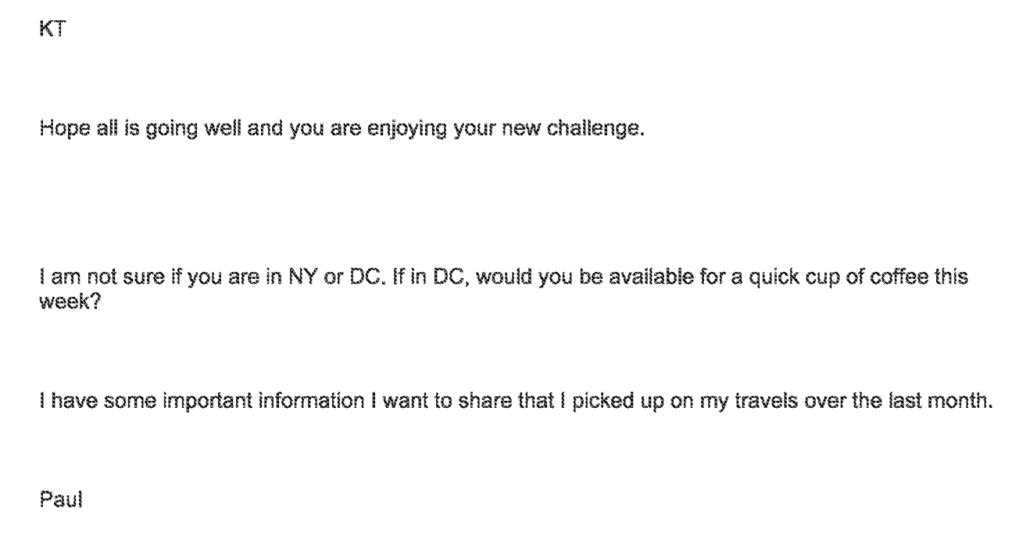
She checked with Mike Flynn, who told her that the “perception” of meeting with Manafort, “especially now” (this was after Flynn’s own back channels with Russia were beginning to become public) would not be good, so to hold off until they were in the hot seats.
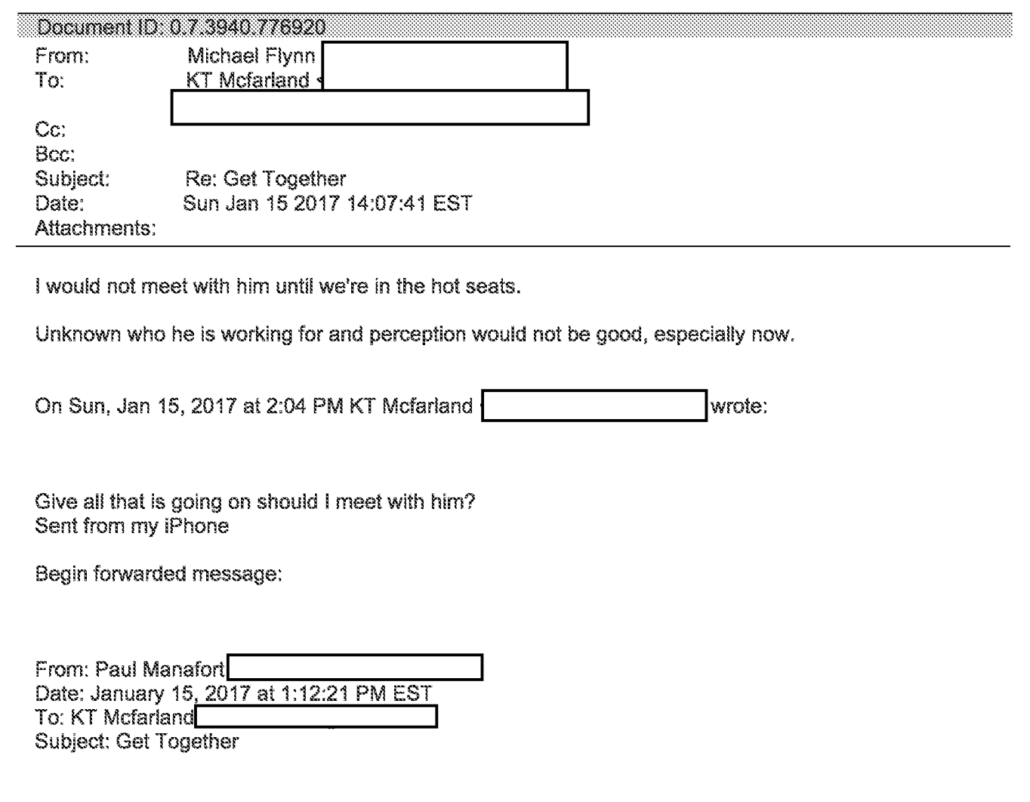
Manafort didn’t meet with Trump’s national security team, but around the same time, per reporting from Ken Vogel, he reached out to Reince Priebus and suggested the errors in the dossier not only discredited it, but also the FBI investigation.
It was about a week before Trump’s inauguration, and Manafort wanted to brief Trump’s team on alleged inaccuracies in a recently released dossier of memos written by a former British spy for Trump’s opponents that alleged compromising ties among Russia, Trump and Trump’s associates, including Manafort.
“On the day that the dossier came out in the press, Paul called Reince, as a responsible ally of the president would do, and said this story about me is garbage, and a bunch of the other stuff in there seems implausible,” said a person close to Manafort.
[snip]
According to a GOP operative familiar with Manafort’s conversation with Priebus, Manafort suggested the errors in the dossier discredited it, as well as the FBI investigation, since the bureau had reached a tentative (but later aborted) agreement to pay the former British spy to continue his research and had briefed both Trump and then-President Barack Obama on the dossier.
Manafort told Priebus that the dossier was tainted by inaccuracies and by the motivations of the people who initiated it, whom he alleged were Democratic activists and donors working in cahoots with Ukrainian government officials, according to the operative. [my emphasis]
According to Rick Gates, at some point Manafort asked Kilimnik to obtain more information from his sources about it, including from Deripaska.
Since that suggestion to Priebus — which he made days after his return from a meeting with Deripaska’s associate — Trump has pursued precisely the strategy laid out by Manafort, using the errors in the dossier — the dossier that all Trumpsters now seem to believe was filled with errors by Russian intelligence and possibly by Deripaska associates — to discredit it and with it, the Russian investigation.
That’s the strategy that led Tucker Carlson’s Daily Caller to report on the dossier full time — including forcing the opinion editor at the time to publish a Deripaska column attacking the dossier.
Fusion GPS’s Simpson, in a New York Times op-ed describing his own Judiciary Committee testimony, claimed a neoconservative website “and the Clinton campaign” were “the Republican and Democratic funders of our Trump research.” The Judiciary Committee’s Sen. Dianne Feinstein (D-Calif.) then unilaterally released, over the objection of committee chairman Sen. Chuck Grassley (R-Iowa), Simpson’s testimony to “set the record straight.” Fusion GPS “commended Senator Feinstein for her courage.”
Yet on March 16, 2017, Daniel Jones — himself a team member of Fusion GPS, self-described former FBI agent and, as we now know from the media, an ex-Feinstein staffer — met with my lawyer, Adam Waldman, and described Fusion as a “shadow media organization helping the government,” funded by a “group of Silicon Valley billionaires and George Soros.” My lawyer testified these facts to the Senate Intelligence Committee on Nov. 3. Mr. Soros is, not coincidentally, also the funder of two “ethics watchdog” NGOs (Democracy 21 and CREW) attacking Rep. Nunes’ committee memo.
A former Obama State Department official, Nuland, has been recently outed as another shadow player, reviewing and disseminating Fusion’s dossier, and reportedly, hundreds of other dossiers over a period of years. “Deep State-proud loyalists” apparently was a Freudian slip, not a joke.
Invented narratives — not “of the people, by the people, for the people,” but rather just from a couple of people, cloaked in the very same hypocritical rhetoric of “freedom” and “democracy” that those are actively undermining — impede internationally shared efforts on the world’s most pressing, real issues, like global health, climate change and the future of energy. My own “Mother Russia” has many problems and challenges, and my country is still in transition from the Soviet regime — a transition some clearly wish us to remain in indefinitely.
And that’s the strategy that led Chuck Grassley, Lindsey Graham, and Ron Johnson to spend their time discrediting the dossier rather than conducting oversight of Donald Trump.
That’s the strategy that led Darrell Cooper to believe (or claim to believe) several false claims about the dossier and then use those false claims to excuse the way Trumpsters lost faith in institutions and so attacked the Capitol. In short, the likelihood that the dossier is disinformation — indeed, the likelihood that the guy twisting the nuts of Trump’s campaign manager fed the dossier full of disinformation even while using that pressure to obtain his cooperation — means that (at least if you believe Cooper’s narrative) that disinformation led, through a series of steps, Americans to attack the American Capitol.
Trumpsters appear to love Cooper’s narrative, I guess because it doesn’t hold them responsible for their own gullibility or betrayal of the country. There are other problems with it (including the replication of other claims that Republicans have agreed is Russian disinformation). But ultimately, even with Cooper’s errors, what his narrative amounts to (at least for all the Trumpsters who believe the dossier was disinformation) is a claim that Russia’s 2016 disinformation campaign led Trump supporters to attack the US Capitol.
Update: After I posted some folks in the thread questioned what the point of the disinformation would be. This post lays out a possible logic to it all.







